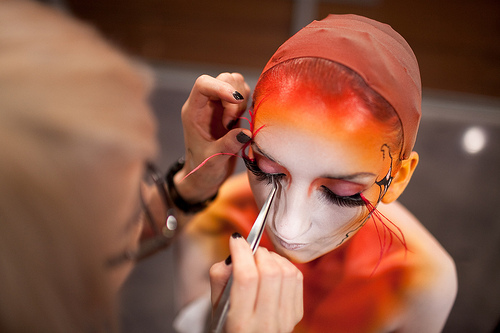Halloween Costume Related Health Hazards

Unfortunately, there are some hidden health hazards that come with dressing up for Halloween that most people don't think about. Some are even scarier than the scariest of Halloween costumes, so read these five safety tips to be sure you don't fall victim this Halloween.
1. Capes
When dressing as a superhero on Halloween, many people wear capes. However, this can be a huge safety hazard. For one thing, capes are highly prone to catching on fire --- especially with all the jack-o’-lanterns everywhere. Also, many people wear capes by tying them around their necks. A long cape can easily be stepped on and therefore choke the wearer.
The lesson here is that you should listen to Edna from The Incredibles; capes are bad. But if you must wear one, it is recommended that you wear a cape made out of nonflammable material and that you attach the cape to yourself by cutting out arm holes instead of tying it around your neck.
2. Contact Lenses
Colored and themed contact lenses, such as vampire or spiderweb lenses, may look great with your costume, but without a prescription, they can be hazardous for your eyesight. According to the FDA, unprescribed contact lenses are not made for safety, so they can cause eye infections or cut the outer surface of your eyes. They could even lead to blindness.
In 2010, a woman went to Vanderbilt University Medical Center seeking medical care after her left eye began swelling, burning, causing her severe pain, and producing abnormal discharge. She learned that she had developed an infectious corneal ulcer, caused by her decorative contact lenses. Though she did not wear her contacts daily, she did wear them a few times a week. The woman complained that she had bought the contacts at a local beauty supply store, and that none of the clerks had warned her that she needed a prescription to buy contacts. Those clerks also failed to mention that buying unprescribed contacts has actually been illegal since 2005!
Many other stores and online sites continue to ignore the law and sell unprescribed contact lenses, and those who are unaware of this law continue to buy them. So don't buy unprescribed contacts for your costume -- even if you think they look cool.
3. Fake Teeth and Paint
According to a 2008 study in Science of the Total Environment, fake teeth and paints used as Halloween props run high risks of lead contamination, a neurotoxin. Many Halloween products such as Halloween themed drinking cups, candy buckets, and fake teeth have been found to have an excess of six percent more lead than the US regulatory limit.
Many other children's products have been contaminated with lead over the years. In 2007, Toys "R" Us had two recalls in a single month because their children's products surpassed the legal limit. This is definitely a cause for concern, considering that all of us who buy fake teeth do put them in our mouths. Lead enters the body the fastest when ingested.
4. Makeup
Makeup adds a finishing touch to a costume, but the FDA advises trick-or-treaters not to use any type of face paint or makeup that contains ingredients unapproved by federal regulators.
Many assume that the ingredients in their makeup bags at home have been thoroughly tested by the FDA and other safety regulators before being mass produced and sold. However, that is not the case. The FDA has little authority over regulating makeup safety; according to law, the FDA can do little more than check for color additives in makeup. In short, cosmetic companies do not need to run their ingredients or products by the FDA before they start selling.
For those prone to allergies or for those who aren’t sure of how their skin might react to certain types of makeup, the FDA recommends that people test out their makeup in small doses prior to the big day. To do this, all you have to do is dab the makeup you want to use on your arm and leave it on for a few days. If a rash or any allergic reaction develops, refrain from using the makeup.
5. Masks
Ill-fitting Halloween masks can cause both impaired vision and breathing problems. In 2011, Target had to recall 3,400 children’s masks because of ventilation problems. So, when choosing a mask, make sure it has good ventilation and offers a proper range of vision.
If your costumes pass these requirements, you can feel free to celebrate and role play to your heart's content! Simply be mindful of what you're doing and what you're wearing on this ominous night.
Reach Staff Reporter Janelle Cabuco here.



